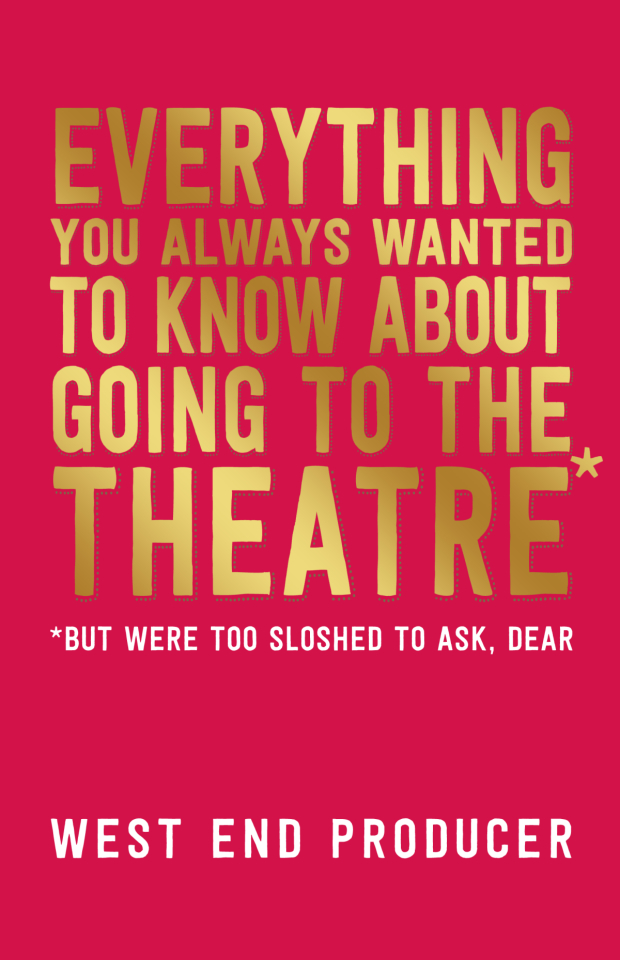10 things to think about before going to the theatre
On the release of his new book, West End producer offers his theatregoing tips

© Matt Crockett
1. Decide what kind of show you want to see
There is no point going to watch a musical if you actually want to watch a play. Or see Miranda Hart if you want to see Lin-Manuel Miranda. Or see Thriller Live if you want to see something good. It sounds simple, but you’d be surprised at how easy it is to get confused.
2. Do your research
Google reviews, check websites (such as the venerable one you’re reading right now), watch the trailer online, listen to the cast recording, write a dissertation, consult a fortune-teller and attend some focus groups. If there’s a filmed version then you could also try that, but be warned – never judge the theatre production by its silverscreen version. I know many people who were put off watching Les Mis after seeing the film. But everyone knows that was Russell Crowe’s fault.
3. Consider where to sit
Each area of the auditorium has its own particular qualities (and its own impact on your chances of developing deep vein thrombosis). Sitting in the stalls generally gives you a very good view, but you may have to remortgage your house for a ticket. At the other end of the scale is the balcony: you may sustain an injury hunched forward trying to get the best view of the tiny blobs onstage, but who cares about permanent neck damage if you only paid a tenner for your ticket?
4. Choose what to wear and take
Today’s world of camera-phones and social media means you must dress correctly at all times, and ideally, select the right outfit to complement what you’re seeing and where you’re going. For instance, when attending the National Theatre, it’s likely you’ll get lost inside – so you should imagine you are back in the Cub Scouts or Girl Guides, and ‘Be Prepared’ for every eventuality. In an intimate studio space, you’ll probably be sitting on hard plastic chairs – so I advise wearing at least three pairs of pants or take your own cushion for added bottom comfort (bumfort).
5. Think carefully about your theatre snacks
Be considerate. Noise, unless coming from the stage, invariably frustrates and annoys other audience members and actors – particularly Imelda Staunton. It takes the focus away from the drama on stage, and brings everyone back to reality when they hear the crunching of crisps, the snapping of Kit Kats, and the salty smell of skipjack tuna. Also be sure to take care with the volume of your mastication (i.e. your chomping and chewing).
6. Work out how to get to your chosen venue
Some theatres are very easily confused because their names are so similar – it’s easy for the uninitiated to mix up the Lyric Theatre, Lyric Hammersmith and Hammersmith Apollo; or the Royal National Theatre, the Royal Court Theatre, Theatre Royal Drury Lane and Theatre Royal Haymarket. Don’t confuse the Apollo Victoria with the Apollo or the Victoria Palace, which is also different from the Palace, The Other Palace, Buckingham Palace, Victoria Station and Victoria’s Secret. And please don’t go to Cambridge to find the Cambridge Theatre, or end up in Chicago to see Chicago.
7. Avoid being late at all costs
If you are late for a show (don’t be!), remember that when being carefully led into the auditorium by a tiptoeing usher, your duty is to be as silent as possible – particularly when working your way into the middle of a row (latecomers always have seats in the middle, it’s the law). In the past I have seen spectacular displays of upstaging from latecomers, ranging from falling over, spilling drinks on OAPs, sitting on and suffocating small children, and refusing to go to their seat by repeatedly stating ‘we don’t want to distract anyone’ which distracts everyone – until finally an usher threatens to swap their ticket for the eight-hour Greek tragedy that’s on at the Almeida.
8. Plan ahead for the interval
Intervals last between fifteen and twenty minutes – depending on how long the queue for the ladies’ loos are. This should give you just enough time to leave your seat, eat an ice cream, have a drink, relieve yourself, tweet about how bad the show is, and decide which actor you’d like to take home with you. Top tip: pre-order your interval drinks. That way as the safety curtain falls you can saunter, whistling, into the bar, casually locate your drinks on the little shelf, waltz to a seat and enjoy your tipple whilst everyone queuing stares on enviously.
9. Don’t forget the different levels of clapping
It can be hard to judge exactly what level of response the show you’ve just seen warrants. If you really loved it, then whoop, cheer and stand on your seat – you could even use the word ‘bravo’ (which also confirms that you’re rather theatrical, dear). Clap politely if you thought it was okay, but wished you’d stayed at home to watch Corrie. Conversely, if you feel so passionate in your disliking of the show that you have the urge to do something about it, then by all means throw rotting fruit and veg at the actors (ideally organc, so they can use it in their NutriBullet the next day).
10. Practise what to say (and what not to say) to the actors at stage door
Fans are a vital part of the theatre world – but it can get a little difficult when fans openly offer their advice and criticism to performers, particularly those in long-running shows. You will occasionally overhear them saying things like: ‘He’s not as good as the one that’s just left’, or ‘She sings like SuBo’ (sometimes their assessments are spot on). It gets even worse when they offer feedback to actors post-show: ‘I think you’re good, but the actress before you did this… and it was much better’. One cardinal rule of theatre is never give an actor any criticism or advice – particularly straight after a show. That is the time when an actor is on an adrenaline high and wants everyone to tell them how good they are, even if they’re not.

In conclusion…
I hope these little tips set you on the right path in your theatregoing quest. For much more, have a read of my new book – Everything You Always Wanted to Know About Going to the Theatre (But Were Too Sloshed to Ask, Dear) – which is packed full of advice to ensure your West End experience is as smooth as Craig Revel Horwood’s nose. Whatever you see at the theatre, may your trip be an enjoyable one – and see you at the bar afterwards, dear!
Everything You Always Wanted to Know About Going to the Theatre (But Were Too Sloshed to Ask, Dear) by West End Producer is out now, published by Nick Hern Books.



















